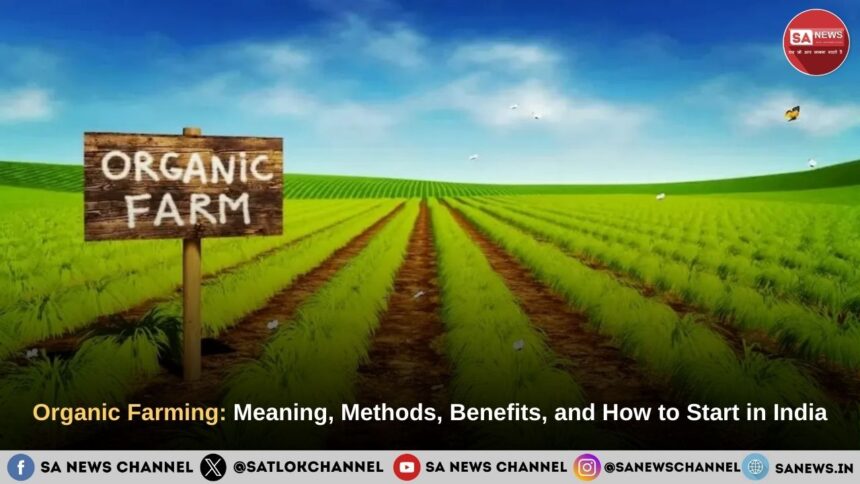In India, the rise of pesticides and fertilizers have given rise to soil degradation at large scales. With organic farming, not only fresh fruits and vegetables are obtained, but it has also enhanced the overall life and fertility of soils effectively. Particularly, in India, the culture of Organic Farming is also promoted by various government schemes and urges citizens to practice Organic Farming at home as well. Explore this comprehensive article to discover details on how Organic Farming is practiced and what the government schemes are offering.
- Introduction: What is Organic Farming?
- History of Organic Farming
- Principles of Organic Farming
- Importance of Organic Farming
- Methods of Organic Farming
- Types of Organic Farming
- Advantages and Disadvantages
- Organic Farming at Home in India
- Why Organic Farming at Home?
- Steps to Start Organic Farming at Home
- Business Angle
- Paramparagat Krishi Vikas Yojana (PKVY)
- FAQs on Organic Farming: Meaning, Methods, Benefits, and How to Start in India
- Q1. What is needed for organic farming in India?
- Q2. Which crops are best for organic farming at home?
- Q3. How to apply for subsidy?
- Q4. Is organic farming costly?
- Q5. Can organic farming be a business at home?
- The Deeper Roots of True Well-Being
- Cultivating the Soul for a True Purpose
Introduction: What is Organic Farming?
The agricultural system of avoiding synthetic fertilizers, pesticides, and genetically modified organisms (GMOs) is Organic farming. It relies on natural processes like composting, crop rotation, bio-fertilizers, and biological pest control.
The principle is simple: Healthy soil —- Healthy crops —- Healthy people.
In India, organic farming is gaining momentum due to the rise in health awareness, export opportunities, and government schemes, safe food, rising awareness about health hazards of chemicals, and government support for sustainable farming practices.
History of Organic Farming
- Traditional Farming: The most ancient Indian agriculture (Vedic practices) used cow dung, compost, and green manures.
- Modern Movement: The term “organic farming” was popularized by Sir Albert Howard in the 20th century, who studied Indian traditional methods.
- India’s Achievement: In 2016, Sikkim became India’s first fully organic state. (PIB)
- Today: India has the largest number of organic farmers globally (FiBL)
Principles of Organic Farming
- Health: Organic farming sustains soil, plant, animal, human, and planetary health.
- Example: Vermicomposting enriches soil microbes —- healthy crops —- healthier diets.
- Example: Vermicomposting enriches soil microbes —- healthy crops —- healthier diets.
- Ecology: It makes sure that farming should work with natural cycles.
- Example: Crop rotation mimics ecosystems by allowing soil to rest.
- Example: Crop rotation mimics ecosystems by allowing soil to rest.
- Fairness: This principle ensures fairness for farmers, workers, traders, and consumers.
- Example: Farmers earn premium prices while consumers get chemical-free food.
- Example: Farmers earn premium prices while consumers get chemical-free food.
- Care: It protects future generations through precautionary methods.
- Example: Avoiding harmful chemicals prevents groundwater contamination.
Importance of Organic Farming
Health Importance
- It produces pesticide-free food.
- Fruits and Vegetables are rich in antioxidants and nutrients, lowering risks of chronic diseases.
Environmental Importance
- It prevents soil degradation.
- It helps in conserving water and biodiversity.
- Greenhouse gas emissions through storage of carbon in soil are reduced.
Economic Importance
- Organic products fetch higher prices in the market, depending on the type of product, because of the smaller scale of production and storage. Also, the certification costs of an organic farmer also adds value. (APEDA Export Data 2023).
- It reduces long-term dependency on expensive chemicals.
Social Importance
- Organic Farming is successful as it creates rural employment due to labour-intensive practices like composting.
- It also encourages youth to adopt sustainable farming.
Fact: India exported 447.73 USD millions worth of organic products in 2024–25 (PIB)
Methods of Organic Farming
- Crop Rotation – It helps in breaking pest cycles and replenishes nutrients.
- Example: Wheat → Pulses → Oilseeds.
- Example: Wheat → Pulses → Oilseeds.
- Green Manuring – Nitrogen-fixing crops (sun hemp, dhaincha) improve soil fertility.
- Composting & Vermicomposting – It converts organic waste into nutrient-rich manure.
- Bio-fertilizers – It makes use of bio fertilizers for increasing fertility. Microbes like Rhizobium and Azotobacter supply nitrogen naturally.
- Biological Pest Control – Use of Neem oil, garlic-chili sprays, and beneficial insects helps in reducing pests.
- Mulching – Conserves soil moisture, prevents weeds.
- Agroforestry – The integration of trees with crops for ecosystem balance is achieved through this process.
Also Read: Carbon Farming in India: Earn from Carbon Credits While Restoring Soil and Fighting Climate Change
Types of Organic Farming
- Pure Organic Farming
- This method uses only natural inputs.
- Example: Small farmers in Uttarakhand using cow dung, compost only.
- This method uses only natural inputs.
- Integrated Organic Farming
- This method combines organic and natural mineral inputs like lime, rock phosphate.
- Example: Kerala farmers integrating organic crops with poultry/fish farming.
- This method combines organic and natural mineral inputs like lime, rock phosphate.
- Permaculture Farming
- Eco-design approach: multiple crops grown together like in forests.
Comparison Table
| Feature | Pure Organic | Integrated Organic | Permaculture |
| Inputs | Only natural | Mix of organic + natural | Ecosystem-based |
| Yield | Moderate | Higher | Balanced |
| Focus | Eco-balance | Productivity + sustainability | Long-term design |
Advantages and Disadvantages
Advantages:
- Nutritious, chemical-free food.
- Improves soil fertility.
- Premium income.
- Reduces carbon footprint.
Disadvantages:
- Lower initial yields.
- Labour-intensive.
- Certification is costly and lengthy.
Organic Farming at Home in India
Why Organic Farming at Home?
- Fresh, chemical-free vegetables.
- Savings on groceries forever with high initial costs.
- Stress relief through gardening.
Steps to Start Organic Farming at Home
- Space: Terrace, balcony, or pots.
- Containers: Earthen pots, grow bags, recycled buckets.
- Soil Mix: 40% soil with 30% compost and 30% cocopeat/sand.
- Easy Crops:
- Leafy: Spinach, methi, coriander.
- Veggies: Tomatoes, brinjal, chilies.
- Herbs: Tulsi, mint.
- Leafy: Spinach, methi, coriander.
- Fertilizers: Homemade compost, cow dung slurry, vermicompost.
- Pest Control: Neem oil spray, garlic-chili solution.
- Watering: Maintain soil moisture, avoid flooding.
- Harvest: Leafy vegetables ready in 30–45 days.
Tip: Begin with 5–6 pots, then expand.
Business Angle
- Urban farmers in India earn INR 30,000–INR 1,00,000/month via organic terrace farming. (Source: Times of Agriculture)
- Opportunities: Compost sales, terrace farming kits, organic vegetable delivery.
Government Schemes for Organic Farming in India
Paramparagat Krishi Vikas Yojana (PKVY)
Objective: Promote cluster-based organic farming.
Support: Maximum assistance is INR 50,000 per hectare for 3 years (covers organic inputs, certification, marketing). Total assistance is INR 14.95 lakhs per cluster for mobilization, PGS Certification and manure management.
How to Apply:
- Approach the local agriculture department.
- Farmers form groups (minimum 20 ha or 50 acres).
- Certification through PGS-India system.
Mission Organic Value Chain Development for North Eastern Region (MOVCDNER)
Objective: Develop entire organic value chain – from farmers to markets.
Eligibility: Farmers of 8 North Eastern states (Assam, Manipur, Meghalaya, Mizoram, Nagaland, Sikkim, Tripura, Arunachal Pradesh).
Support Includes:
- Subsidy for organic inputs. (75% to FPC and 50% to Private Companies).
- Support for processing units.
- Branding and market linkages.
Application Process:
- Contact the State Department of Horticulture/Agriculture.
- Register under farmer clusters.
- Receive training, certification, and financial assistance.
Benefit to Common Man: Even small farmers can join cooperatives and earn better prices due to collective branding.
National Programme for Organic Production (NPOP)
Objective: Standardize organic farming for exports.
Authority: APEDA under Ministry of Commerce.
Eligibility: Farmers, processors, traders involved in organic produce.
Application Process:
- Visit an APEDA-accredited certification body.
- Submit application with land records.
- Pay certification fee (subsidized under schemes like PKVY).
- Inspection of farmers’ practice is done.
- After a 3-year transition period, get organic certification.
- Certifications are subjected to renewals and inspections.
Benefit: Farmers gain international market access where organic produce fetches 2–3x price.
Visit the website from here for detailed information about the scheme.
National Mission on Sustainable Agriculture (NMSA)
Objective: Promote sustainable farming practices including organic farming through the use of rainfed technologies.
Eligibility: Farmers across India.
Support:
- Promote Rainfed Agriculture.
- Build Climate Resilience Methods.
- Training on organic inputs preparation.
- Subsidy for bio-fertilizers, compost units.
- Promotion of On Farm Water Management (OFWM).
Application: Apply via District Agriculture Officer.
Benefit: Provides small-scale support for adopting eco-friendly practices helping farming to become climate resilient through implementation of various techniques, helping aim farmers for organic farming.
For more information and registration, visit the website.
Capital Investment Subsidy Scheme (CISS)
Objective: Establish organic input production units, bio-fertilizer units, cold storage and godowns.
Eligibility: Entrepreneurs, NGOs, cooperatives, farmers, firms, Private companies and many others.Visit the website for in depth eligibility details according to the project type.
Support: 33.33% subsidy (up to INR 63 lakh) for units producing bio-fertilizers, bio-pesticides, and compost in North-Eastern states and 25% (up to INR 50 lakh) otherwise.
Application Process:
- Submit project proposal to NABARD or state agriculture department.
- On approval, a subsidy is released.
- After project completion, inspection is done.
- Final subsidy is released after inspection and completion.
Benefit to Common Man: Farmers can set up small compost/vermicompost units as side businesses for additional income.
Official Website: NABARD
Rashtriya Krishi Vikas Yojana (RKVY)
Objective: Encourage state governments to innovate in agriculture, including organic farming projects by receiving assistance from the centre.
Eligibility: Farmers, FPOs, entrepreneurs and businesses.
Support: Grants for organic farming clusters, training, and innovation projects.
Application: Apply through the state agriculture department when calls for proposals are announced. Funds are released in installments, next installment are released upon verification and inspection.
Benefit: Provides opportunities for community-level organic projects like farmer cooperatives or FPOs.
Website: RKVY
Why a Common Man Should Opt for Organic Farming?
- Safer Food: Protects family from harmful chemicals.
- Business Opportunity: Growing urban demand ensures profitable returns.
- Government Support: Subsidies reduce financial burden.
- Environmental Responsibility: Contributes to soil, water, and biodiversity conservation.
- Employment Creation: Small-scale businesses like compost production can generate income.
Organic Farming vs Zero Budget Natural Farming
| Feature | Organic Farming | Zero Budget Natural Farming (ZBNF) |
| Inputs | Compost, bio-fertilizers | Cow dung & urine-based inputs |
| Certification | Required for exports | Not mandatory |
| Cost | Medium | Very low |
| Origin | Global concept | Indian concept |
Future of Organic Farming in India
- The Indian organic food market is expected to hit INR 75,000 crore by 2025 (GOI). However, it will be interesting to see when the exact as achieved figures will be disclosed.
- Rising urban demand and export growth — profitable future (particularly for rural youth).
- Govt targeting a significant increase of overall farmland organic by 2030. So, there is a scope in the field of organic framing from the business point of view.
FAQs on Organic Farming: Meaning, Methods, Benefits, and How to Start in India
Q1. What is needed for organic farming in India?
Fertile land with no chemical use, certification and organic resources.
Q2. Which crops are best for organic farming at home?
Spinach, coriander, chilies, brinjal, tomatoes.
Q3. How to apply for subsidy?
Register under PKVY/MOVCDNER via local agriculture office or PGS India Portal.
Q4. Is organic farming costly?
Initially yes, but input costs reduce, and organic products sell at higher rates.
Q5. Can organic farming be a business at home?
Yes, through terrace farming, composting units, and organic vegetable delivery.
The Deeper Roots of True Well-Being
Today, as people grow more health-conscious, organic farming has become a popular choice — not just for nourishing our bodies, but also for protecting the planet. The idea is simple — by eating food free from chemicals and pesticides, we can live healthier and longer lives. It’s an amazing movement, built on values of health, ecology, fairness, and care. By respecting nature’s cycles, organic farming promises a cleaner, more sustainable future for generations to come.
But here’s something to think about — while eating pure food and living in peace with nature is important, does it really solve all of life’s struggles? We might follow the perfect diet, breathe fresh air, and live in the most natural way possible, yet sorrow and suffering still find their way into our lives.
A plate of organic vegetables can’t shield us from the grief of losing someone, the stress of financial troubles, or the emptiness that sometimes haunts us from within. Maybe the real ‘toxins’ we need to cleanse aren’t just in our food, but inside us in the form of greed, anger, and ego. If organic farming helps the earth bear fruit and vegetables, then perhaps we should also ask — what are we doing to nurture our own souls, so they too can yield a harvest—one of peace and eternal happiness?
Cultivating the Soul for a True Purpose
The spiritual wisdom shared by Jagatguru Tatvdarshi Sant Rampal Ji Maharaj answers a deeper longing that healthy food or lifestyle alone can never satisfy. He explains that our pain is not simply the result of physical or environmental factors — it goes much deeper. Every illness, every loss, every hardship we face is tied to our unseen karmic accounts, built from past deeds. No amount of organic food, exercise, or worldly effort can clear the bad karmas in our destinies. These things may nourish the body, but they cannot free the soul from the cycle of birth and death.
The real solution, Sant Rampal Ji Maharaj teaches, lies not in cultivating farms but in cultivating our own wisdom through the wealth of true spiritual knowledge shared by Him. Through the true method of worship revealed by Him, one can break free from karmic bonds and attain a state of spiritual purity — far greater than any physical makeover could ever offer. This purity is what brings lasting peace, real happiness, and freedom from sorrow — a life no longer attached to suffering.
Discover unimaginable facts in His eye-opening spiritual discourses at:
- Website: www.jagatgururampalji.org
- YouTube: Sant Rampal Ji Maharaj
- Facebook: Spiritual Leader Saint Rampal Ji
- ‘X’ handle: @SaintRampalJiM









